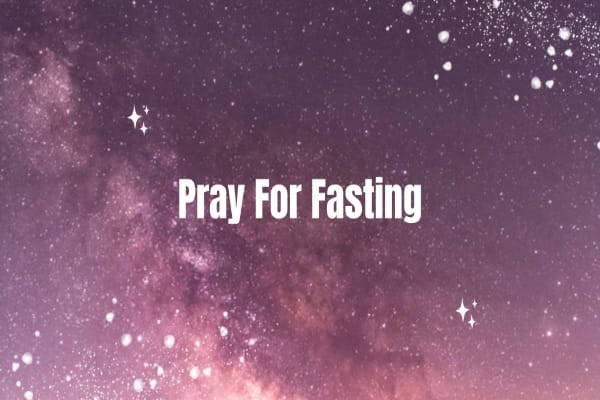Pray For Fasting
Before Fasting Dua (Pray)
بِسْمِ اللهِ الَّذِيْ صَوَّمَنِيْ، وَسَقَّنِيْ، وَهُدِيَنِيْ، وَجَعَلَ لِي الْمُسْلِمِيْنَ
Transliteration:
Bismillahil-ladhi sabaqani, wa saqahu, wa hudiya, wa ja’ala lilmuslimin.
Meaning:
“I begin my fast in the name of Allah, who made it obligatory for me to fast, and (He) quenched my thirst, and provided me with water, and nourished me.”
Upon Breaking the Fast Dua (Pray)
اللَّهُمَّ اِنِّى لَكَ صُمْتُ وَبِكَ امنْتُ [ وَعَلَيْكَ تَوَكَّلْتُ ] وَ عَلى رِزْقِكَ افْطَرْتُ
Transliteration:
Allahumma inni laka sumtu wa bika aamantu [wa ‘alayka tawakkaltu] wa ‘ala rizq-ika-aftartu.
Meaning:
“O Allah! I fasted for You and I believe in You and I break my fast with Your sustenance.”
This supplication is not directly mentioned in the Quran but is found in various hadiths. The specific reference for this supplication can be found in:
Sunan Abu Dawood 2358 (Book 13, Hadith 2348)
Sunan At-Tirmidhi 3456 (Book 48, Hadith 3441)
These prayers are recited before beginning the fast and upon breaking it, and their practice is in accordance with the tradition of the Prophet Muhammad (peace be upon him) as known from the Hadith.
Introduction
In the tapestry of Islamic devotion, prayer and fasting stand as pillars upon which believers construct their spiritual edifice. The intertwining of supplication and fasting, deeply rooted in the Quran and Hadith, forms a sacred bond between the worshipper and the Divine. This article embarks on a profound exploration of the spiritual significance of prayers before and after fasting, unraveling their intricate relationship within the Islamic faith.
Prayer Before Fasting: An Invocation of Faith
Before embarking on the sacred journey of fasting, Muslims invoke the name of Allah, the Most Merciful, acknowledging His benevolence and seeking His guidance. The prayer uttered before the first light of dawn breaks serves as a solemn pledge, a covenant between the servant and the Creator. In the tranquil moments before the fast commences, believers beseech Allah for sustenance, both physical and spiritual, as they prepare to embark on a day of abstinence and devotion.
The words “In the name of Allah, the Most Merciful,” resonate deeply within the hearts of believers, serving as a reminder of divine compassion and mercy. With each syllable uttered, the worshipper finds solace in the knowledge that their fast is not a solitary endeavor but a journey guided by the grace of Allah.
“As I fast for Your sake,” the supplicant proclaims, affirming their commitment to the divine commandments. In this simple yet profound declaration lies the essence of fasting in Islam—a surrender of the self to the will of Allah, a testament to unwavering faith and obedience.
Prayer Upon Breaking the Fast: A Symphony of Gratitude
As the sun dips below the horizon and the call to prayer echoes through the evening sky, Muslims gather to break their fast, eagerly anticipating the moment of spiritual rejuvenation. With hearts brimming with gratitude and lips moistened with the remembrance of Allah, they recite the prayer upon breaking their fast, a symphony of thanksgiving and reverence.
“O Allah! I have fasted for You, believed in You, and rely upon You,” the supplicant intones, their voice echoing across the expanse of the heavens. In these words lies the essence of unwavering faith, a testament to the unyielding trust placed in the Divine.
With each morsel of food consumed, believers offer their gratitude to Allah, recognizing His boundless mercy and provision. In the act of breaking their fast, they find not only physical nourishment but also spiritual fulfillment, a reaffirmation of their devotion to the path of righteousness.

The Spiritual Nexus: A Tapestry of Devotion
The prayers before and after fasting serve as threads woven into the intricate tapestry of Islamic devotion, binding the worshipper to the Divine in an unbreakable bond of faith and submission. In the moments of quiet contemplation before the fast commences and the jubilant celebration upon its conclusion, believers find solace, strength, and spiritual fulfillment.
As Muslims around the world observe the sacred practice of fasting, may they find solace in the power of supplication, drawing closer to Allah with each word uttered and each moment of reflection. In the union of prayer and fasting lies the essence of Islamic devotion, a journey of the soul guided by the light of divine grace.
Challenges and Growth: The Journey of Faith
However, this sacred journey of fasting and supplication is not without its challenges. Throughout the long hours of fasting, believers may grapple with physical discomfort, hunger, and fatigue. In moments of weakness, the prayers recited before and after fasting serve as beacons of hope, guiding the faithful through the trials and tribulations of their spiritual journey.
As the sun sets and the fast is broken, Muslims are reminded of the transformative power of gratitude. In expressing thanks for the sustenance provided by Allah, believers cultivate a spirit of humility and appreciation for the blessings bestowed upon them. Through the act of supplication, they acknowledge their dependence on the Divine, finding strength in their vulnerability and grace in their humility.
Reflection and Renewal: The Essence of Spiritual Growth
Beyond the physical act of abstaining from food and drink, fasting in Islam is a deeply spiritual endeavor—one that fosters introspection, self-discipline, and spiritual growth. In the moments of prayer before and after fasting, believers are afforded the opportunity to reflect on their actions, seek forgiveness for their shortcomings, and renew their commitment to the path of righteousness.
As the days of fasting unfold, Muslims are encouraged to deepen their connection with Allah through acts of worship, charity, and self-reflection. In the stillness of the night, as they stand in prayer before their Lord, believers find solace in the knowledge that their supplications are heard and their sins forgiven.



Conclusion: The Journey Continues
In the sacred nexus of supplication and fasting, believers embark on a journey of spiritual transformation—a journey guided by the light of divine grace and fueled by unwavering faith. As Muslims around the world observe the sacred practice of fasting, may they find solace in the power of prayer, drawing strength from the words of remembrance and finding renewal in the act of devotion.
As the sun sets on another day of fasting, believers are reminded of the boundless mercy and compassion of Allah. In the act of supplication, they find solace, strength, and spiritual fulfillment, reaffirming their commitment to the path of righteousness and drawing ever closer to the Divine.
In the tapestry of Islamic devotion, prayer and fasting stand as pillars of faith—a testament to the enduring power of spiritual connection and the transformative nature of divine grace. As believers continue on their journey of faith, may they find solace in the words of remembrance and strength in the act of devotion, drawing ever closer to the Divine with each passing moment.
